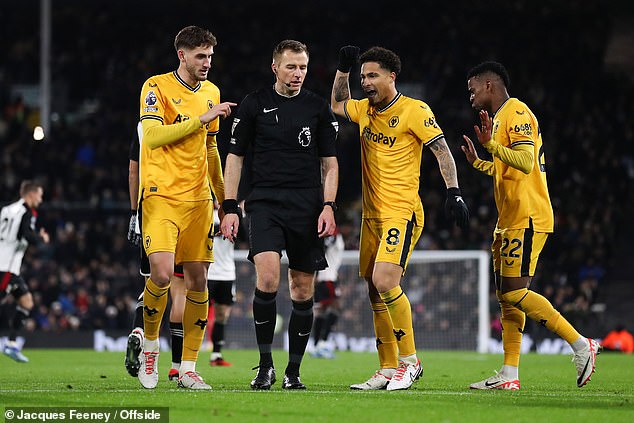Football chiefs APPROVE plans to trial sin bins after crunch talks in London – with only team captains able to approach the referee in a bid to stamp out abuse towards officials
Sin bins will be trialled at higher levels of professional football after the International Football Association Board (IFAB) met in London on Tuesday to discuss the rules of the game.
As part of the approved proposal, only team captains will be able to approach referees, with football chiefs keen to increase respect for officials and stamp out abuse.
At the IFAB’s annual Business Meeting at the five-star Sofitel Hotel near Heathrow, it was agreed that team captains will be able to approach the referee in ‘certain major situations’.
The new proposals come in the wake of Mail Sport’s campaign to stop the abuse of officials in football, fueled by the harrowing stories of abuse shared by grassroots referees on the It’s All Kicking podcast.
Ten-minute sin bins will be tried ‘for dissent and specific tactical offences’ after they are successfully implemented in grassroots football.
Sin bins will be tried in professional football. Lewis Dunk is shown a red card for dissenting from Anthony Taylor during the match between Brighton and Nottingham Forest on Saturday

Wolves players argue with referee Michael Salisbury after conceding a penalty against Fulham – a decision that PGMOL later agreed was incorrect following their controversial 3-2 defeat
Sin bins have been hugely popular since their introduction to primary and junior football in England in 2019, with players displaying derogatory words or actions forced to leave the pitch for 10 minutes of the match.
The successful legal case against match officials wearing body cameras at grassroots level was also discussed at the meeting in London – and football lawmakers will continue to monitor its value.
Brighton captain Lewis Dunk was sent off by Anthony Taylor at the weekend after persistently arguing with the referee, even after initially being shown a yellow card for dissent.
In addition to the abuse towards referees, the IFAB spoke about possible strategies to combat wasting time, discussed the six-second rule for goalkeeper distribution, delayed restarts and dealing with injuries.
To speed up the VAR process, it was agreed that semi-automated offside technology will continue to assist match officials on the pitch in a bid to speed up decision-making.
The meeting, chaired by Scottish FA chief executive Ian Maxwell, also discussed a possible review of the rules for next season. Law 12 (Fans and Misconduct) will be amended so that penalty handball offenses will be punished in the same way as fouls.
During the international break, two young referees revealed the extent of the abuse that forced them to leave their posts in interviews for Mail Sport’s It’s All Kicking Off podcast.
Rhys Baldwin made the decision to retire as a referee in April after eleven years. The 25-year-old shockingly explained how he had knives pulled on him and his car tinkered with in response to referee decisions he made during matches.
Fellow former referee George Sleigh, who quit after suffering a broken jaw from a player he sent off in a five-a-side match, believes behavior should be at the top but also at the bottom change.
Mail Sport exclusively revealed last week that the FA had backed our campaign to eradicate abuse towards officials, saying: ‘Referees are the lifeblood of our game.’
“We support the Ny Breaking campaign to encourage and promote respect for them,” an FA spokesperson said.
‘This is also a key priority for us, and at the start of this season we introduced a range of measures to help improve the behavior of players, managers and coaches in English football as part of our ‘Love Football, Protect The Game ‘-campaign. .
‘It has a clear focus on tackling unacceptable behavior towards referees and match officials.’
Statistics revealed as part of Mail Sport’s campaign show that the number of dissent offenses has more than doubled among players and almost quadrupled among coaches in English football this season, compared to the previous campaign.
